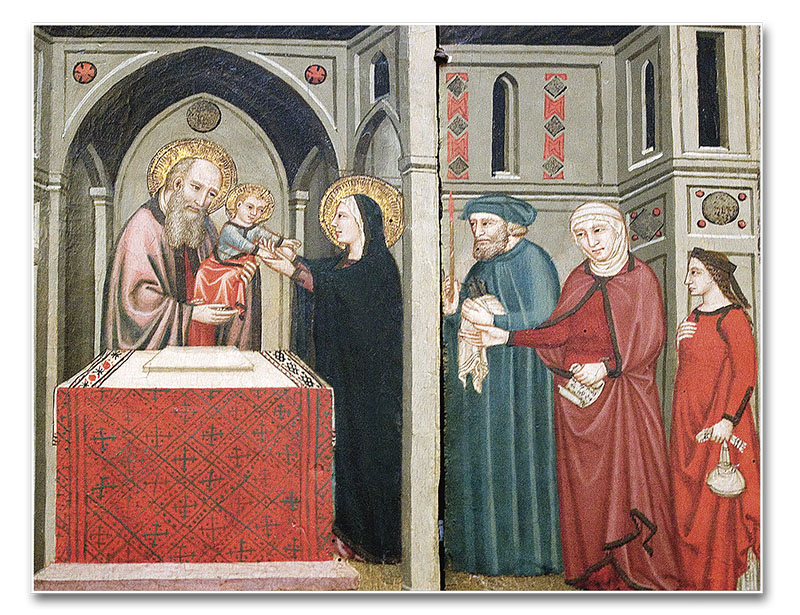An excellent means of praying well, following the example of St. Simeon, is to take Our Lord in our arms; that is, to have Him in the depths of our heart.
Let us now see how we can find in today’s Gospel an excellent way of saying our prayers well. Some people are greatly mistaken, imagining that many methods are necessary to pray well. We see them become distressed for this reason, laboriously striving for some particular art which they feel is necessary to attain this objective. As a result, they constantly scrutinize their prayers to determine whether or not they are said correctly. Some even believe that they must be careful not to move, so that the Spirit does not leave them, as if God were so delicate as to concern Himself with the methods and capacities of those who pray.
I am not affirming that there are no time-honoured rules and methods for praying well. But we should not bind ourselves so strictly to them, or become so attached to them as to hinge all our confidence upon them. This would be to suppose that we may give these considerations more importance than our own affections, and expect satisfactory results.
The example of Simeon
On the contrary, we must understand that only one thing is necessary to pray well: to hold Our Lord in our arms, like St. Simeon; that is, in the affections of our heart. In this way, we will always pray well, regardless of how we go about it. Without this condition, our prayer can never be accepted by God.
“No one comes to the Father, but by Me” (Jn 14:6), Our Lord said. Prayer, according to the Fathers and Doctors of the Church, is an “uprising of the mind to God.”1 We could never do this on our own; but when we have Our Lord in our arms, everything becomes easy.
And to prove this, I ask you, dear faithful, to consider this holy man, Simeon, and see how well he prayed, having Jesus in his arms: “Lord, now lettest Thou Thy servant depart in peace, according to Thy word; for mine eyes have seen Thy salvation” (Lk 2:29-30). Let Thy servant go in peace, he says, for he has seen his salvation and His Lord.
Indispensable mediation of Jesus Christ
Evidently, it would be an extreme abuse to wish to exclude Our Lord Jesus Christ from our prayer and think it could be well done without His assistance, for it is undeniable that we can only be pleasing to the Eternal Father when He sees us through His Son, our Saviour. And not only men, but also the Angels, for the fact is that Christ, while not their Redeemer, is their Saviour. The Angels were justified and confirmed in grace by Him, because Christ merited this for them, as we read in Revelation (cf. Rv 12).
When we look through red or violet-coloured glass, everything we see seems to take on that hue. In the same way, the Eternal Father, beholding us through the beauty and goodness of His Sacrosanct Son, will find us beautiful and good in accordance with what He hopes of us. Without this artifice, we would appear before Him with our own ugliness and deformity.
Prayer, as the Fathers of the Church state, is none other than the raising up of our minds to God. And although in elevating ourselves to God we encounter Angels and Saints on our way, we do not lift our hearts to them so as to remain in them, nor do we have them as the object of our prayers, as the heretics perfidiously claim. We only beseech them to unite their prayers to ours, to make a holy medley, so that in this sacred blending, ours will be better received by the Eternal Father, to whom they will always be pleasing if we have with us His beloved little Benjamin, as did the sons of Jacob when they went to meet their brother Joseph, in Egypt (cf. Gn 42–43). This is because if we do not take Him with us, we will bear the penalty with which Joseph threatened his brothers: they would no longer see his face, nor receive anything from him if they did not bring him their youngest brother.

Conditions to receive the Child Jesus
Now, our little brother is this Divine Infant that Our Lady carries to the Temple today, presenting Him herself, or through St. Joseph, to the good and aged Simeon.
However, it is more likely to have been St. Joseph and not Our Lady, for two reasons: the first is that it was the role of the men to offer their sons, as their obligation was greater than the mothers’. The second is that, until they were purified, women did not dare approach the altar where the offerings were made. Whichever of the two it was, it does not matter, we need only know that St. Simeon took this blessed newborn in his arms, from the hands of Our Lady or St. Joseph.
Oh, how happy we would be to go to the Temple, prepared to receive this grace of receiving from Our Lady, or from her beloved spouse, St. Joseph, our Divine Saviour! For, holding Him in our arms, there would be nothing else wanting to us, and we could well sing the sacred canticle: “Lord, now lettest Thou Thy servant depart in peace, according to Thy word.” Let Thy servant go now in peace, O my God, for my soul is fully satisfied, possessing all that is most desirable in Heaven and on earth.
Let us briefly consider the necessary conditions for obtaining this grace of receiving and carrying Our Lord in our arms, as did St. Simeon and Anna, the good widow who had the happiness of being in the Temple at the moment in which the Child was presented there.
First condition: taking Our Lord in our arms
In the first place, our attention is drawn to the Evangelist’s observation that St. Simeon was “righteous and devout” (Lk 2:25a). In many places of Sacred Scripture, the word devout denotes respect toward God and things pertaining to His service; thus, we gather that this good elder was filled with the fear of God and of reverence for sacred things. But St. Luke further comments that he sought the consolation, that is to say, the Redemption of Israel, and the Holy Spirit was upon him: “expectans consolationem Israel, et Spiritus Sanctus erat in eo” (Lk 2:25b).
All of this indicates to us four essential conditions for praying well. The first, we have already said, is to take Our Lord in our arms, in our affections, as did the good St. Simeon, especially because this is the essence of true prayer.
Second condition: to adapt our will to God’s
As to the second condition, the Evangelist says that the holy old man was righteous, in other words, he had perfectly adapted his will to that of God, living according to His holy Law. We, too, will certainly never be able to undertake holy prayer well if we do not unite and adapt our will to God’s. And often this is what is lacking.
For example, you sometimes see a person who is about to pray. Ask him why he does so. He will respond that it is to ask God for consolations, and to beseech Him deliverance from the many distractions that continuously disturb him during prayer. What, then; do you not want to adapt your will to God’s? Indeed, entering into prayer, you must be resigned to suffer the annoyance of distraction, the aridity and tedium that may come to you, remaining just as content as if you had experienced much consolation and serenity. For one thing is certain: your prayer will be no less pleasing to God, or less fruitful for you, for having been accomplished with greater difficulty, as long as you adapt your will to that of the Divine Majesty.
By this means, you will always pray and do everything else with profit for yourself and in a way pleasing to the eyes of God, which is what we should desire.
Third condition: to live in the expectation of perfection
The third condition is that, like the good St. Simeon, we ought to expect the Redemption of Israel; that is, we must live in expectation of our own perfection. Oh, how happy are those who, living in this hope, never tire of waiting!
This is what I say to many who, desiring to attain perfection through the acquisition of virtues, want to have them all at once, as if perfection were just the desire. Oh, what a great advantage it would undoubtedly be if we could be humble as soon as we so desired, and if we could clothe ourselves effortlessly in virtues, just as easily as putting on a garment!
We must accustom ourselves to seeking our perfection with tranquillity of heart, following the ordinary ways, doing everything we can to acquire the virtues, and to be faithful in practising them, each according to his own vocation. Then, as for reaching the desired goal sooner or later, remain in expectation, in the hands of Divine Providence, who will be sure to console us in His own time, just as He did St. Simeon. And even if we should wait until the hour of our death, we must conform ourselves.
Thus, let us be content in doing what is within our means, and we will obtain perfection, always sooner than we desire, as long as we have it when it pleases God to give it to us.
Fourth condition: reverence and fear of God
The fourth condition is to be God-fearing like St. Simeon; that is, full of reverence before God at the time of prayer. Ah, dear souls, what respect ought we to have toward the Divine Majesty, in whose presence even the Angels, who are so pure, tremble?
However, I would say that we cannot have in our prayers such a sentiment of His presence as to provoke an utter humiliation of all the powers of our soul, or such a sensible reverence that our soul feels diminished and abased before God, in the knowledge of His infinite grandeur and our extreme littleness and unworthiness.
Oh, surely, such a sentiment is not necessary in order to have fear of God! It is sufficient to have this reverence in the will and the superior part of our soul. How edifying it is to see the veneration with which St. Simeon held Our Lord in his arms, for he knew the sovereign dignity of the One he carried!
The Holy Spirit does not dwell in a deceitful and foolish heart
Furthermore, I repeat that the Holy Spirit was upon St. Simeon and made His dwelling place in him: “et Spiritus Sanctus erat in eo.” Thus, he deserved to see Our Lord and carry Him in his arms.
In the same way, we must make room for the Holy Spirit in us, if we want Our Lady or St. Joseph to give us the Divine Saviour of our souls, to hold in our arms – Him from whom proceeds and in whom consists all our happiness. It is, after all, only by His mediation and favour that we will have access to His heavenly Father. But what must we do to make room for the Holy Spirit?
I will pour out my Spirit on every living being, says God to the prophet Joel: “effundam Spiritum meum super omnem carnem” (Jl 2:28). The Holy Spirit has filled the whole earth, says the wise man, in the first chapter of the Book of Wisdom: “Spiritus Domini replevit orbem terrarum” (1:7). Nevertheless, in the same place it is said that He does not dwell in a deceitful and foolish heart: “Spiritus enim Sanctus disciplinæ effugiet fictum” (1:5).
Here is an important fact! The Holy Spirit has not the least reserve in making His dwelling place in us; as long as He does not find in our hearts insincerity, deceit, and hypocrisy. These defects impede the Divine Consoler from residing in our souls and showering us with His graces and heavenly blessings. We need to be simple, without pretence or deceit, if we want Him to come to us, and Our Lord after Him. For the Holy Spirit wishes to be the precursor of our Saviour, Jesus Christ. As the Holy Spirit proceeds from Him as God, from all eternity, it seems He desires to make retribution with the inversion: Our Lord proceeding from the Holy Spirit, as Man.

Eternal reward: to be carried in the arms of the Lord
What more can we say, if not that, by having the Holy Spirit within us during this fleeting and mortal life, having great respect and reverence before the Divine Majesty, awaiting with submission for the coming of our perfection, and adapting our wills as closely as possible to God’s, we will most assuredly have the happiness of carrying Our Lord in our arms, just as the good St. Simeon. And by means of this grace, we will be able to pray very well.
Notwithstanding, as a prior condition we must faithfully imitate Our Lord and Our Lady in the practice of a perfect obedience, founded in a profound, true and sincere humility, as we have said.
After this, we will have only to sing with St. Simeon: “Nunc dimittis servum tuum, Domine.” Now Lord, let Thy servant go in peace to the joy of eternal life, in which Thy goodness will carry us eternally in Thy arms, in exchange for having carried Thee in ours during the course of this mortal life. So be it. ²
Excerpts from the Sermon for the day of the Purification of Our Lady.
In: “Œuvres”. Paris: Société Générale de Librairie Catholique, 1881, t.VI, p.17-26
Note
1 ST. JOHN DAMASCENE. De fide orthodoxa. L.III, c.24.







